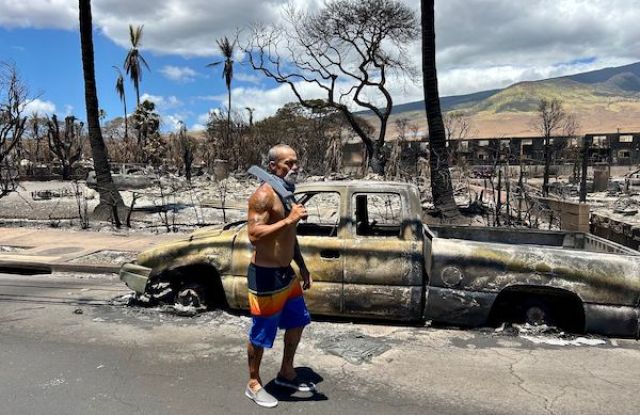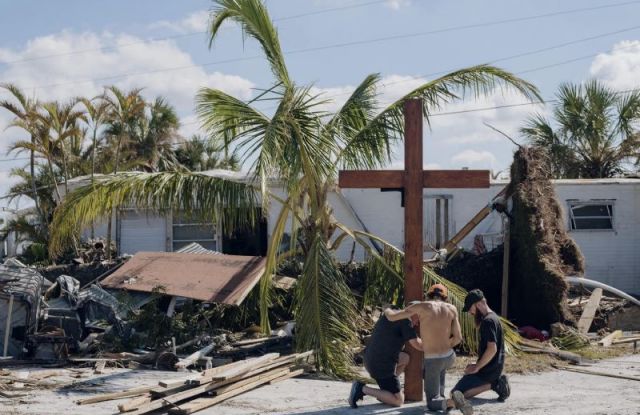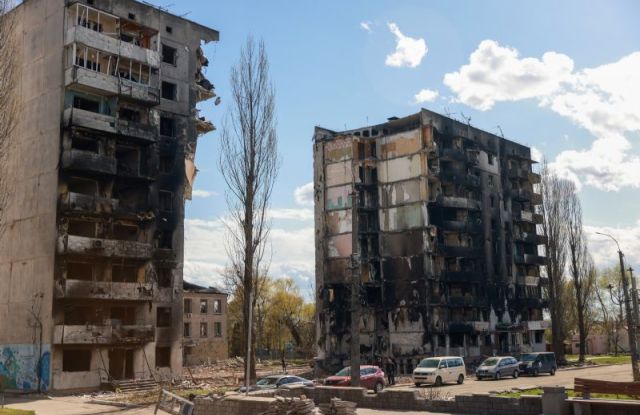Yesterday 3 Children Drowned

Emily Tuttle is with our team in Lesvos. They meet the refugees as they come off the boats. “Yesterday,” she says, “another boat capsized and three young children drowned.”
She describes what she’s seen:
A couple miles from where we live there is a massive pile of life jackets and deflated lifeboats. Local fisherman collect them from the beaches after the refugees land and tow them to a place where they’re collected and brought here.
The piles extend in every direction more than ten feet tall. It’s been cleared away four times already, so if you combine them there are enough life jackets to cover an NFL football field 25 feet deep.
And each of them represents a person, a story, a life. Half a million individual people have put on questionable plastic life jackets, boarded weak rubber boats, and made the journey to an unknown land for the chance to live.
I’ve met just a handful of them, but the stories that come to rest here could fill a thousand books.
At another camp, Aubrey Fite recorded what it feels like in the video above. It is horrific to lose family to terrorists, leave everything and have to run for your life.
Jamison Schrock was in Lesvos and got up close and personal with refugees. Here’s his report:
The refugees would come up to us from the beach, soaking wet and borderline hypothermic. We gave them food, a warm drink, and dry clothes. Later that night, we got word that we had a family that had lost their little boy at sea. The mother had panicked, looked away for a second, and then he was gone, simply disappeared from the boat.
To my knowledge, they never found him. We were then told this was a daily occurrence, and that if it all became too much for us, we were allowed to take a moment and cry if we needed to.
As time went on, the camp was expanded and improved upon, until it was three times the camp it had been when we had gotten there. The rain finally went away, and many nights proved to be good sailing weather for the refugees.
Representing countries from all over Europe, working with these people was, in my mind, the perfect picture of the United Nations. We were all working together in harmony for a common cause, and the best cause for that matter. There was no bickering or arguing, and we all grew to love each other.
On certain nights, there would be a lull in activity as many settled in, or as we waited in-between boats. I would often take advantage of these moments to get to know some of the refugees and hear their story. Every story broke my heart. I encountered refugees fleeing from every known terror group.
One had lost a brother to a car bomb, and was on the hit list himself. Others were leaving their wives and children, knowing they would not see them for a minimum of five years. However, out of these dark and somber moments, bright moments would shine through as well.
In one instance, which I did not witness, an entire family left Islam to start a new life with Jesus. Haha, they were so excited. Another man I talked to began telling me about his faith in Jesus. It wasn’t until later in the conversation that I realized I was the first person he had ever openly confessed his faith to. My mind was blown.
He was overjoyed to find that very nearly the entire camp was run by Christians. The contrast between our shore and Turkey’s grew even darker in my mind. There were also smaller moments. There were many nights when I would sit with them and have meaningful conversation, and they were just happy to have a friend.
Other nights, we played soccer, shouting at each other in our own languages. One night we even had a dance party, showing each other different dances we knew. I often made it a point to grab their Facebook info so I could keep in touch with them. Some of them made it where they were going, others are still waiting to get in last I checked. The one thing that I learned most from these people, however, was selflessness.
Selflessness was the one overwhelming attribute that these people exuded. They put me to shame. On more than one occasion, I would be talking with a refugee, when they would randomly offer me cookies or fruit from their humble food stash. I would try to refuse, but they would not hear it, saying, “No! No! I have plenty!” in their thick accents. Other times, they would offer us gifts. My teammate was given prayer beads and an unexpected spray of cologne.
I myself complimented a man on his turban, after which he proceeded to take it off his head and wrap it on mine for me. My heart was a puddle. Still other times, they would go around, unasked, and help us clean up the camp. It was the only way they felt they could repay the debt they felt they owed us, so we would let them. Out of all these moments, however, the most impacting moment happened at the beach.
We were finally asked if we would be willing to work a beach shift. Basically, all you do on a beach shift is watch for boats, then guide them in when they do come, and tend to any of their immediate needs. So there we sat, binoculars in hand, scanning the coastline of Turkey for boats.
Finally, one came in. Taking about 40 minutes to cross, the little rubber raft, highlighted by orange lifejackets, coasted to within shouting distance. The people, filled with both joy and terror, began shouting and singing. They began standing up, attempting to jump in the water and swim to shore in their excitement. We jumped in the water, telling them to sit down and be patient as we did so. We lined the back of the boat up with the shore, and helped them unboard. One man was so happy that he leaned out of the boat and kissed me on the cheek.
Later, after everyone was on shore, many thanked us for our help as we passed out water, clothes, and food. I then began talking with a younger guy about my age. I had heard the stories of mistreatment and abuse the refugees sometimes suffer at the hands of the people smuggling them across, and said, “Man, what do those smugglers do to you guys?” He proceeded to roll up his sleeve, and showed me red welts all up and down his forearm. Once again, my heart crumbled.
Standing in the midst of them all, I would’ve balled like a baby had I let myself. The sorrow that I felt for them, mixed with the joy I felt for them having escaped it all safely, was overwhelming. Never before had I felt so abundantly fulfilled in my life, and never before had I felt so much like the hands and feet of Jesus. Sometimes, I just went up to them and hugged them. That’s all I could do for them once their needs were taken care of. So I showed them love as best I could. No other boats came in that day, but that was okay. That one boat was all I needed. I had gotten what I came for, and done what I came to do.
When we were in Athens, waiting to board a train, a man stumbled into our gateway. He was disheveled with a defeated, desperate look about him, carrying a plastic bag, and stammering in horribly broken English. “Money! No…noo druugs. Streets…two days. Teeket. Pleeeeease.”
Wary at first, as we are used to beggars constantly approaching us for money, we were able to piece together that he had been in the streets for two days, and that he was asking for money for a train ticket. His story seemed legitimate, and he seemed desperate enough. So we all agreed to pitch in and buy a ticket for him. Sending people with him to keep him honest, we bought the ticket.
The man broke down, weeping and sobbing, he proceeded to kiss all of us and tell us he loved us over and over. It wasn’t until later that I realized I had helped Jesus buy a train ticket. Never again will I make the mistake of thinking God is done using me because there’s no more time.
What’s your attitude toward refugees? It’s become such a politicized and fear-drenched topic. As we approach this next election, is it any wonder that those candidates who appeal to our fear the most find themselves doing well with the electorate?
What would Jesus’ attitude toward refugees be? Does our own perspective need an adjustment?



Amazing, what impact the World Race has had on us as parents. It is an indescribable feeling to know my child is helping other people’s children. Helping other mothers and fathers. Taking the light and love of Christ to countries I may never go and to places I may never see.
Odd, how my own heart is being enlarged and how the suffering of others is suddenly more personal to me…now that we’ve got skin in the game.
What a blessing.
“now that we’ve got skin in the game” – amen! God has skin in the game – literally Jesus’ skin broken on our behalf. He knows what it is to have a son sent on a healing mission and invites us into the same process.
You’re killin’ me. What an incredible opportunity this would be. I certainly don’t want to miss Thailand, but a PVT to Lesvos? That would be tempting.
I want to go. Have to.
Go, Michelle, go!
Our daughter, Rebekah, was there in Greece during the month of December with the World Race. Her descriptions, along with those of other racers (like the ones you quote here), have moved us to prayer and giving and been passed on as we share them with others in our church and community. While the general media in our country is “moving on” from the “refugee story”, it is our aim to keep telling these stories as long as there are people still seeking help and hope. Thank you for doing that as well!
Michelle – I’m feeling the same stirrings. Similar to a stirring years ago when I knew I had to see the Swazi orphans with my own eyes – and going and doing that changed me. For me, it’s not primarily about “doing” something, although I would certainly want to be fully engaged that way. There’s just something in me that sometimes needs to see a thing in order to catch a little more of a glimpse of God’s heart.
How about a parent PVT this spring?
The Expedition Squad PVT is scheduled for Greece but not until early fall. Spring PVTs are already set, parents have purchased tickets, etc. But there are some moms who are wanting a “mom” counterpart to the dads’ trip we are offering to Swazi in May. This might work. A number of our volunteers and other parents are teachers. If we could do summer instead of spring it would open up the possibility to them.
Keep me in the loop on that Betty. I was thinking maybe they’d need/like some navigators on the Sept trip, but early summer would work better. 🙂
I want to go too!! Been reading these blogs about the refugees and strongly feel the need to go help.
Rhonda – We can’t really change the announced PVTs but I’ll explore the possibility of a separate mom’s trip.